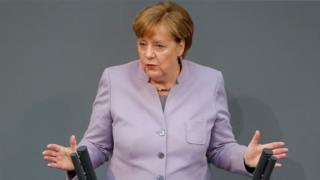 Image copyright
Image copyright
Reuters
German MPs frequently applauded Ms Merkel’s points about Brexit
German Chancellor Angela Merkel says some British people have “illusions” about discussing the UK’s future ties with the EU at the same time as nailing down the UK’s Brexit terms.
An EU-UK deal can only be discussed once the exit issues – such as UK payments to the EU budget – are resolved, Mrs Merkel told German MPs.
The UK initiated the formal procedure to leave the EU on 29 March.
It sets a two-year deadline for completion of the exit negotiations.
EU leaders are to meet on Saturday to adopt their joint negotiating position on Brexit. They are working on the basis of draft guidelines issued on 31 March.
Official talks will not begin until after the UK general election on 8 June.
UK Prime Minister Theresa May called the early election, saying she needed to strengthen her hand in Brexit negotiations.
- All you need to know about the UK leaving the EU
- European Parliament’s ‘red lines’
- Brexit: Special report
The EU wants the terms of the UK’s exit to be decided before any discussion of a future trade relationship, while Mrs May wants the two issues to be dealt with simultaneously.
The German chancellor told German MPs it would be “a waste of time” to maintain illusions that the two sets of negotiations could be held simultaneously.
EU Trade Commissioner Cecilia Malmstrom said the EU would “for sure” reach a free trade deal with the UK after Brexit.
But Mrs Merkel warned that it would be a different relationship, saying: “A third country – which is what the UK will be – cannot and will not have the same rights as an EU member state.
“All 27 EU countries and the EU institutions agree about that,” she told the Bundestag, Germany’s lower house of parliament.
Tough all along: Analysis by Jenny Hill, BBC News, Berlin
Angela Merkel’s priorities are clear: to preserve the integrity of the EU and to secure the rights of its citizens living in the UK.
Her speech today may have sounded tough. In truth she is simply repeating what she’s said all along: Britain cannot expect to cherry-pick in these negotiations. EU unity matters here, so she’s sticking – more or less – to the Brussels script.
Germany is likely to take a moderately softer stance than, say, France. Sources here indicate there might be, for example, some wriggle room over the figure of the Brexit bill. There is little appetite for a punitive approach – Germany, of course, has an eye to its economic relationship with Britain. Nevertheless even the business lobby here (including the head of the association of Germany’s all powerful automotive industry) acknowledge that the EU’s interests must come first.
It’s also worth noting that Brexit is also not the central focus for Berlin. There is a degree of frustration among politicians who are already preoccupied – not only with other challenges facing Europe, including migration, terror, conflict – but with their own looming general election.
Mrs Merkel said the immediate Brexit priorities to decide on were the rights of EU citizens in the UK and Britons in continental Europe and Britain’s ongoing financial obligations.
“We can only do an agreement on the future relationship with Britain when all questions about its exit have been cleared up satisfactorily,” she said.
“The sooner the UK government is ready for constructive solutions, the sooner we can meet its wish to talk about the future relationship. But first we need to know how the UK government envisages that relationship. It can only be done in that sequence.”
EU officials estimate that the UK faces a bill of €60bn (£51bn; $65bn) because of EU budget rules. UK politicians have said the government will not pay a sum of that size.
Mrs Merkel stressed the need to protect the interests of some 100,000 Germans living in the UK.
Image copyright
AFP
EU Brexit negotiator Michel Barnier (L) held talks with PM Theresa May on Wednesday
But she went on to say “we are also ready to make a fair offer to British citizens in Germany and the rest of Europe.
“They are an important part of our community and should remain so.”
Mrs Merkel noted the difficulty of unpicking 44 years’ worth of EU legislation that counts the UK as a member state.
The people who will negotiate Brexit
Experts have warned that it usually takes the EU many years to negotiate free trade deals with non-EU countries. The EU-Canada deal, Ceta, was concluded after eight years of talks.
Brexit timetable:
- 29 April – 27 EU leaders (excluding the UK) meet in Brussels to adopt Brexit negotiating guidelines
- 8 June – UK parliamentary election – Brexit talks to start soon after the vote
- 24 September – German parliamentary election, with Mrs Merkel seeking a fourth term
- 29 March 2019 – Deadline for ending talks on UK exit terms (any extension requires agreement of all member states)
- May or June 2019 – European Parliament election (without UK)
- Ratification – Any Brexit deal requires ratification by all EU’s national parliaments and European Parliament
Brexit: Chancellor Merkel warns of UK ‘illusions’ over talks with EU

